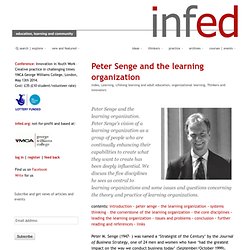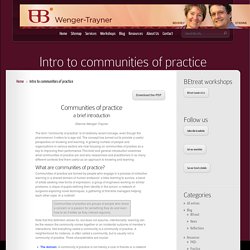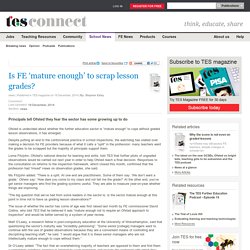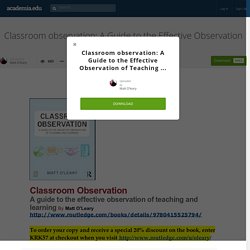

Lincs.ed.gov/publications/pdf/EDVAE09C0042ImpLiteracy.pdf. Raising Standards - DfES. Quality & Strategy. Quality Improvement through Collaboration with Others. The learning organization: principles, theory and practice. The learning organization. Just what constitutes a ‘learning organization is a matter of some debate. We explore some of the themes that have emerged in the literature and the contributions of key thinkers like Donald Schon and Peter Senge. Is it anything more than rhetoric? Can it be realized? www.emcett.com/site_files/uploads/High%20Performance%20Colleges%20Magic%20Dust.pdf. Peter Senge and the learning organization. Contents: introduction · peter senge · the learning organization · systems thinking – the cornerstone of the learning organization · the core disciplines · leading the learning organization · issues and problems · conclusion · further reading and references · links Peter M.

Senge (1947- ) was named a ‘Strategist of the Century’ by the Journal of Business Strategy, one of 24 men and women who have ‘had the greatest impact on the way we conduct business today’ (September/October 1999). While he has studied how firms and organizations develop adaptive capabilities for many years at MIT (Massachusetts Institute of Technology), it was Peter Senge’s 1990 book The Fifth Discipline that brought him firmly into the limelight and popularized the concept of the ‘learning organization’. Since its publication, more than a million copies have been sold and in 1997, Harvard Business Review identified it as one of the seminal management books of the past 75 years. Peter Senge. Work-Based-Learning-Workforce-Survey-Final.pdf. SIR-Report.pdf. Www.et-foundation.co.uk/wp-content/uploads/2014/09/RPT-Survey-v4.pdf. ACL-Survey-Final.pdf. Dtihpwprac.pdf.
Intro to communities of practice. The term “community of practice” is of relatively recent coinage, even though the phenomenon it refers to is age-old.

The concept has turned out to provide a useful perspective on knowing and learning. A growing number of people and organizations in various sectors are now focusing on communities of practice as a key to improving their performance.This brief and general introduction examines what communities of practice are and why researchers and practitioners in so many different contexts find them useful as an approach to knowing and learning. What are communities of practice? Note that this definition allows for, but does not assume, intentionality: learning can be the reason the community comes together or an incidental outcome of member’s interactions.
eprints.hud.ac.uk/11074/1/Graylingvol1no1doi.pdf. archive.excellencegateway.org.uk/media/Welcome%20to%20Research/Semmelweis_publication.pdf. Is FE ‘mature enough’ to scrap lesson grades? - news - TES. Comment:Last Updated:19 December, 2014Section:news Principals tell Ofsted they fear the sector has some growing up to do Ofsted is undecided about whether the further education sector is “mature enough” to cope without graded lesson observations, it has emerged.

Despite putting an end to the controversial practice in school inspections, the watchdog has stalled over making a decision for FE providers because of what it calls a “split” in the profession: many teachers want the grades to be scrapped but the majority of principals support them. Lorna Fitzjohn, Ofsted’s national director for learning and skills, told TES that further pilots of ungraded observations would be carried out next year in order to help Ofsted reach a final decision. Responses to the consultation on reforms to the inspection framework, which closed this month, confirmed that the profession had “mixed” views on observation grades, she said.
Ms Fitzjohn added: “There is a split. Classroom observation: A Guide to the Effective Observation of Teaching and Learning. See how observation can be used as a supportive, constructive tool, instead of being a summative process.

Help other customers find the most helpful reviews Was this review helpful to you? Yes No Thought provoking book on a topic of great interest for educational professionals , 20 Sep 2014 By Verified Purchase This review is from: Classroom Observation: A guide to the effective observation of teaching and learning (Paperback)